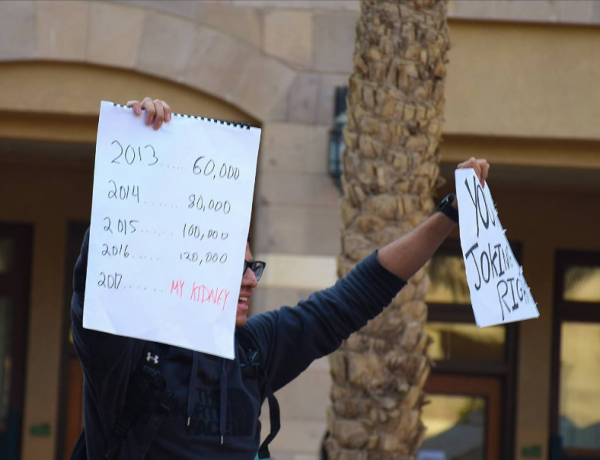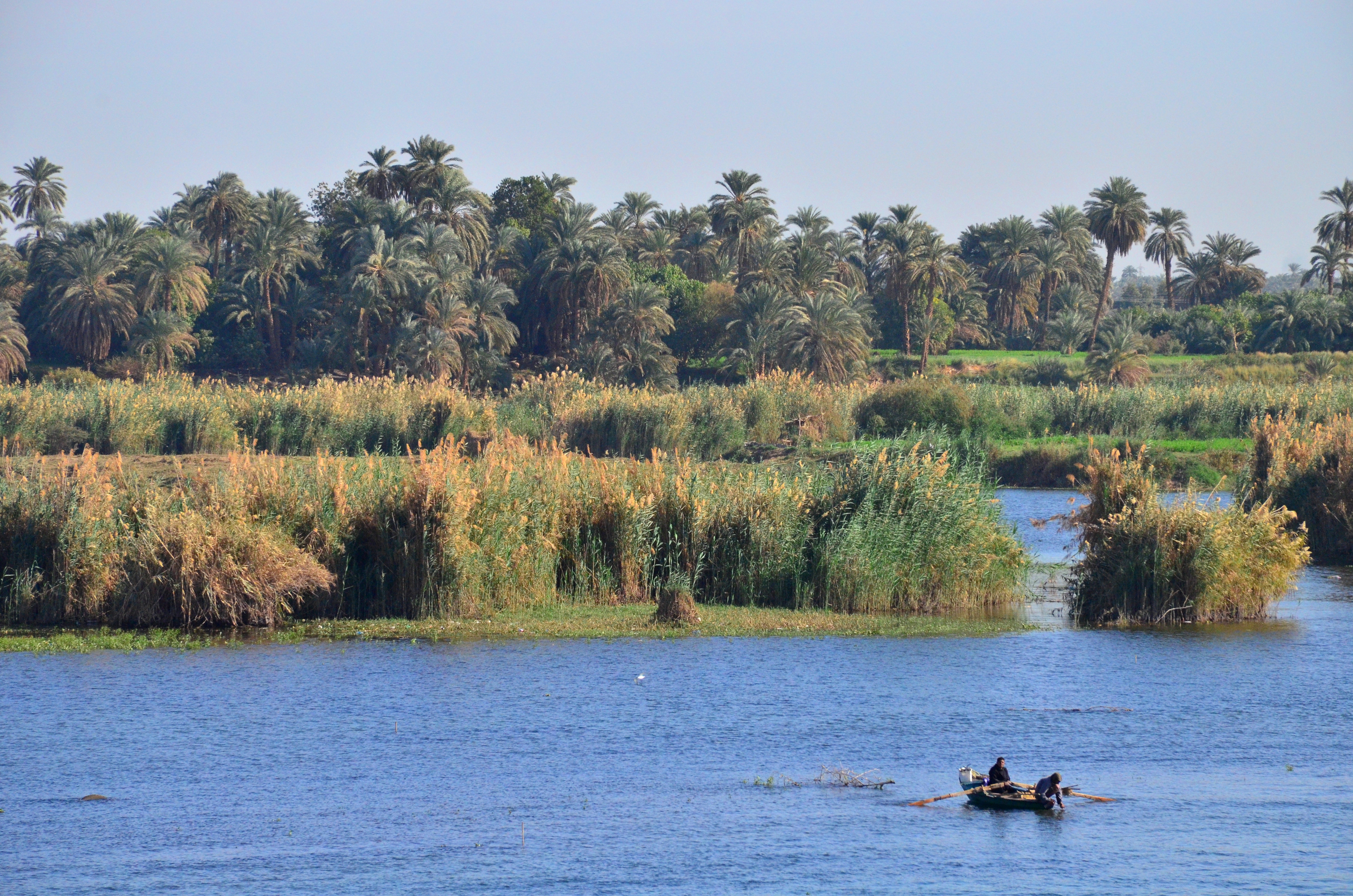Rashed: ‘Egyptians Must Hold On to Hope of Restoring Tourism’
BY RIHAM MAKLAD AND SOPHIA EL BEHEIRY
@RIHAMMAKLAD
@SOPHIAELBEHEIRY
![Rashed believes in that it is vital Egyptians cling to their heritage and channel their efforts into revitalizing the tourism industry in the country [Labeled for reuse off Youtube]](http://www.auccaravan.com/wp-content/uploads/2016/05/minister-e1462830302475.jpg)
In an interview with The Caravan, Rashed said that there are some misconceptions in the policies of tourism marketing and that he is willing to work full force to change that by communicating with the world in the language of tourists.
He added that the Ministry of Tourism will create a website featuring all Egyptian cities to serve as a go-to guide for restaurants, sites, service companies such as airlines, and all other matters that would benefit tourists visiting the country.
The following is an excerpt from the interview:
What does the Ministry of Tourism plan to do in the future to revive the flow of tourists to Egypt?
After my appointment as Minister of Tourism, I set down a plan called the “Six-over-Six” plan. The aim of this plan is to identify the six key elements that will help restore tourism within a period of six years.
Revitalizing tourist flow to Egypt is at the forefront of this plan. It is a key demand which will be the main focus of the Ministry of Tourism as it is a very important first step for the success of the “Six-over-Six” plan.
After evaluating the current situation – and with the collaboration of a team of tourism industry experts – I concluded that we will have to start a dialogue with tourists to understand their thoughts and desires.
We will rely on having Egyptian antiquities in all the capitals of the world. At this point, what Egypt possesses in historical treasures isn’t as much of a priority; instead we should focus on what the tourist himself desires.
The second element is to create a website about Egypt that provides relevant and comprehensive information about the country. We will take full advantage of technology on a large scale. I also hope for free Internet access in Egypt.
The third element is to create world-class entertainment venues and to host international food festivals representing different cultures, in addition to hosting global arts festivals and operas. There will be an annual calendar for Egypt’s touristic events, so that tourists get an insight on all the events and occasions.
The fourth element consists of improving the quality of tourism products and services by employing specialized international companies to train those working in this sector.
The fifth element is to expand the use of clean or green energy. The hotel industry will use solar energy to reduce the burden on electric power. This thereby limits greenhouse gas emissions and reduces carbon dioxide.
This will minimize operating costs and attract tourists who come from cultures which understands this [environmental conservation] very well. We began to implement this model in Hurghada successfully.
The sixth element focuses on encouraging businessmen to invest in Egypt and to establish tourism projects with the full support of the media.
How do you view the current political situation in the country?
Global tourism is facing unforeseen challenges due to political instability, so it’s not only about Egypt. However, I must admit that the political situation in Egypt is more challenging than in other countries.
The real crisis in Egypt is that people do not take into account what would happen if tourism died out. But that is why it is necessary to point out the unique aspects of different civilizations, and most importantly – ours.
Many criticize and attack the country, using social media to highlight the negative without mentioning the positive.
They fail to realize that they are not only critical of the government but that they are also damaging the image of tourism and culture of the country, not only for the government.
I think it is normal for there to be comments on the negative aspects of tourism in Egypt, and that may be in the public interest, but some exaggerate in their criticism without suggesting solutions for the main problem.
What do you think of the campaign “This is Egypt” adopted by former Minister of Tourism Hisham Zazou?
One of the main aspects that set Egypt apart from other countries is that it is one with a deep-rooted heritage, and any campaign that benefits Egypt is an important campaign.
Among these campaigns is “This is Egypt”, which continues to target publicity for Egypt in a civilized manner by highlighting all its components. The campaign emphasizes how Egypt’s archaeological treasures distinguish it from other countries of the world.
True, there is criticism from some that the campaign was hijacked in its dissemination, showing things that do not benefit tourism. Yet, overall the campaign was important and should continue.
The campaign ‘This is Egypt’ means ‘what is owned by Egypt’. Moreover, all the tourists in the world certainly like seeing Egypt due to its global reputation.
So we must work on presenting it in the most beautiful image, not through overly poetic language, but by working on the ground and coming up with sustainable ideas and learning from previous mistakes. We are in a race against time and it is a game of survival.
Egypt must recover its reputation for tourism as soon as possible. This is the responsibility of all Egyptians and mine also as Minister of Tourism.
What are the chances of success for your plan given current conditions?
The plan aims to attract 10 million tourists in 2017. We want to develop the infrastructure and work on formulating a comprehensive plan for tourism in Egypt. There are barriers that we must get rid of, such as the language barrier that prevents communication between the tourist and those working in the sector, but we will work on welcoming tourists starting from this upcoming month, using updated technology that suits their culture, so that the tourist feels comfortable during their stay.
We are now working on launching a website about Egypt which covers all the towns and cities. It gives the tourists a chance to get to know the history, traditions and famous landmarks of the towns and cities. Furthermore, the website will also feature information about restaurants, hotels and other services that the tourists look for during their visits.
We must also revisit how the Egyptian currency is used. We are misusing the currency in an unjustifiable way. It is important that we take a serious stance to stop this phenomenon, which may be the reason behind exporting a false image of the country and its people.
One of the social phenomenons that also hurt Egypt’s image is the excessive use of vulgar language that is out of step with our culture. We must keep in mind that our values are displayed in our language and that we have the responsibility of representing our civilization’s stature in the best light.
What proposals did you make in order to improve airport services?
There is coordination with the Ministry of Aviation to benefit the most from the network of Egyptian airports. I have suggested flying directly across the Atlantic to coastal city airports such as Hurghada or Sharm El Sheikh.
Fortunately, Egypt has a network of international airports scattered in most tourist areas and they are known for their great reputation. Also, we’re working on coordinating with leading countries that help the movement of tourism in Egypt to ensure airport security operates with the highest efficiency.
What is your vision for the future of tourism in Egypt?
My expectations are that tourism in Egypt will develop in the coming period through a series of steps that are aimed to effectively promote it. There is full cooperation with a group of businessmen interested in supporting these plans with whatever it takes to ensure success and efficiency, and to enhance the industry in general.
We will also break ground on a number of important projects, which emphasize Egypt as a country with a unique civilization, and that we must respect the founders of this civilization, and build up this reputation to promote the country in the way we hope for.
Additionally, the quality of education is very important in the promotion of tourism and any country that wishes to succeed has to upgrade its education system. It is important to integrate the love of the homeland in the youth.
What is your advice for the Egyptian youth and what should their role be in developing tourism?
I do not like giving advice, but my word for them is the importance of tolerance towards the other. Young people must build themselves on their own, and not to place blame on the government, but rather to cooperate with it for the sake of Egypt.



